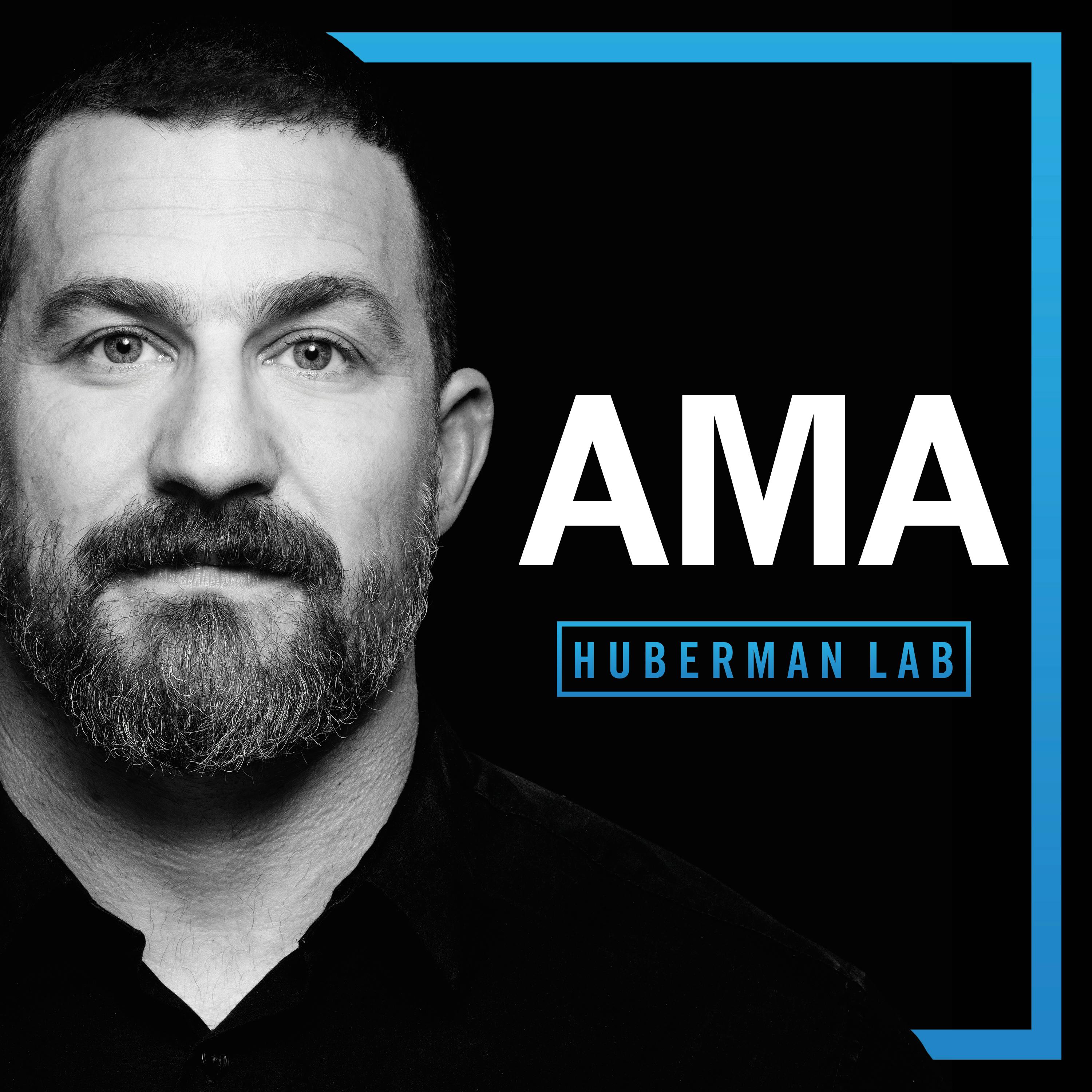
May 31, 2023 • 22min
AMA #7: Cold Exposure, Maximizing REM Sleep & My Next Scientific Studies
Huberman Lab

Key Takeaways
- Deliberate cold exposure for 1-10 minutes is unlikely to directly cause illness, as long as you warm up properly afterwards
- Cold, dry air can increase susceptibility to infections by thinning the protective mucus lining in the nose and throat
- If you're already sick or feeling run down, it's best to avoid deliberate cold exposure and instead focus on rest and warmth
- Regular cold exposure (e.g. 3x/week for 6 weeks) may boost immune markers over time, though more research is needed on specific effects
- Cold exposure and cyclic hyperventilation trigger release of epinephrine and norepinephrine, which can have both immune-boosting and immune-suppressing effects depending on context
- Nasal breathing is generally preferable to mouth breathing for limiting exposure to pathogens, except during intense exercise
Introduction
This episode is an Ask Me Anything (AMA) preview from the Huberman Lab Premium subscription channel. Dr. Andrew Huberman, a neurobiology professor at Stanford, answers listener questions on various scientific topics related to health and performance. The Premium channel was launched to support the free podcast and fund human research studies, with matching donations from the Tiny Foundation.
Topics Discussed
Can Cold Exposure Cause Illness? (1:45)
The main question addressed is whether deliberate cold exposure can cause colds or other illnesses. Dr. Huberman explains that brief cold exposure (1-10 minutes) followed by warming up is unlikely to directly cause illness. However, prolonged exposure to cold, dry air can increase susceptibility to infections by thinning the protective mucus lining in the upper respiratory tract.
He states: "If you get into a cold shower or a cold plunge or a cold ocean or a cold lake, and then you get out and you're out there shivering and shaking, trying to boost your metabolism or whatever it is that you're doing it for, and it's cold, dry air, and especially if you're mouth breathing in that cold, dry air. Yes, I could see how that might lead to a higher probability of getting a cold or other type of infection."
- Brief cold exposure (1-10 minutes) followed by warming up is unlikely to directly cause illness
- Prolonged exposure to cold, dry air can increase infection risk by thinning protective mucus
- Mouth breathing in cold, dry air may further increase susceptibility
Cold Exposure When Already Sick (6:00)
Dr. Huberman advises against deliberate cold exposure when already feeling sick or run down. He recommends:
- Avoid cold exposure if feeling unwell due to cold, flu, or infection
- Instead, opt for warm baths/showers or mild sauna use
- Focus on rest and recovery when sick, rather than stressful practices
- If only mildly unwell and determined to do cold exposure, warm up thoroughly afterwards
Immune Effects of Cold Exposure (8:01)
Dr. Huberman discusses research on the immune effects of cold exposure, citing a study where subjects were exposed to 14°C (57.2°F) water for 1 hour, 3 times per week for 6 weeks. Key findings:
- Single cold exposure did not significantly change immune function
- Repeated exposure over 6 weeks showed trends toward increased immune markers like interleukin-6 and various T cells
- Effects were not statistically significant, only trends
- Difficult to determine how these changes translate to actual infection resistance
Mechanisms of Cold Exposure and Immune Function (12:02)
Dr. Huberman explains the key mechanisms by which cold exposure may affect immune function:
- Cold exposure triggers release of epinephrine and norepinephrine in brain and body
- These molecules can have pro-immune effects in the short term
- However, chronic elevation, especially late in the day, can reduce immune cell efficiency
- Similar effects seen with cyclic hyperventilation (e.g. Wim Hof breathing)
Wim Hof Breathing and Immune Response (14:02)
Dr. Huberman discusses a study on "Wim Hof breathing" (cyclic hyperventilation) and its effects on immune response:
- Study injected participants with E. coli endotoxin, causing flu-like symptoms
- Those who did cyclic hyperventilation beforehand had reduced symptoms
- This was due to suppression of certain immune responses, not enhanced immunity
- Epinephrine/norepinephrine release suppressed fever response
Balancing Cold Exposure and Immune Function (16:03)
Dr. Huberman summarizes the complex relationship between cold exposure and immune function:
- Cold exposure and hyperventilation can enhance immune function if done regularly
- However, excessive norepinephrine/epinephrine can suppress immune response
- This suppression may reduce symptoms but doesn't necessarily fight off pathogens
- Context and individual health status are crucial for determining appropriate use
Recommendations for Cold Exposure Practice (18:03)
Dr. Huberman provides practical recommendations for cold exposure:
- If feeling good/great: Do cold exposure, allow natural rewarming
- If slightly run down: Do cold exposure if desired, but warm up thoroughly after
- If feeling ill/run down: Avoid cold exposure and other stressors
- Focus on rest and recovery when sick, allowing body to devote resources to healing
- Practice nasal breathing when possible to reduce pathogen entry
Conclusion
Dr. Huberman emphasizes that the relationship between cold exposure and immune function is nuanced. While regular cold exposure may have potential immune-boosting effects, it's crucial to consider individual health status and context. When sick or run down, prioritizing rest and warmth is generally the best approach. The key is to find a balance that supports overall health and resilience without overtaxing the body's resources.
This episode preview highlights the depth of scientific discussion available in the full Huberman Lab Premium AMA sessions. Subscribers gain access to in-depth answers on a wide range of health and performance topics, while supporting both the free podcast and important human research studies.







